COVID-19: TCTMD’s Dispatch for February Week 3
We’re curating a list of COVID-19 research and other useful content, and updating it regularly.
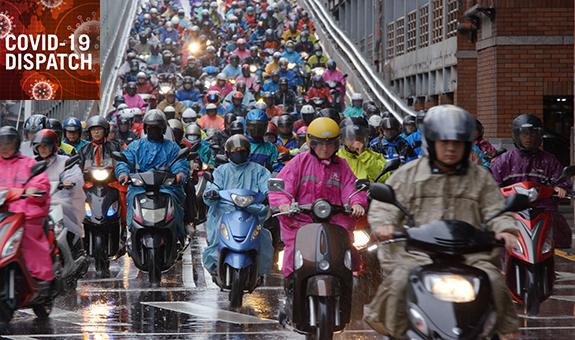
Since March 2020, TCTMD reporter Todd Neale has been writing up breaking news and peer-reviewed research related to COVID-19 every weekday. In July 2021, we transitioned to Mondays, Wednesdays, and Fridays. If you have something to share, tell us. All of our COVID-19 coverage can be found on our COVID-19 Hub.
February 18, 2022
 In one of the largest law enforcement operations in Canadian history, police have moved in to clear the country’s capital city of demonstrators and long-haul trucks that have blocked downtown Ottawa as well as a number of US-Canadian borders for 3 weeks. The move comes after Canadian Prime Minister Justin Trudeau invoked the never-used-before Emergencies Act to limit protest locations and freeze funding, some of which has been traced to far-right organizations. Millions of dollars have flowed both from within and outside the country to support the blockade, initially protesting vaccine mandates and pandemic measures.
In one of the largest law enforcement operations in Canadian history, police have moved in to clear the country’s capital city of demonstrators and long-haul trucks that have blocked downtown Ottawa as well as a number of US-Canadian borders for 3 weeks. The move comes after Canadian Prime Minister Justin Trudeau invoked the never-used-before Emergencies Act to limit protest locations and freeze funding, some of which has been traced to far-right organizations. Millions of dollars have flowed both from within and outside the country to support the blockade, initially protesting vaccine mandates and pandemic measures.
Statewide masking requirements are lifting across much of the United States, with Hawaii being the only state yet to announce plans to relax mandates, the New York Times reports. California, meanwhile, is the first state to unveil its plan to treat COVID-19 as endemic. Becker’s Hospital Review has the details.
According to an analysis in the Wall Street Journal, a record 4,700 patients acquired COVID-19 in-hospital last month when Omicron was peaking—that’s up from 1,100 during the Delta surge and 2,050 during the pandemic’s first wave in winter 2020.
The first such analysis from Canada confirms that Omicron infections in the province of Ontario led to fewer hospitalizations and deaths than those seen during earlier waves of the pandemic. Those findings are in-line with those from other countries including Scotland, South Africa, and England, “all of which have demonstrated substantial decreases in risk associated with Omicron,” authors report in JAMA.
Pfizer agreed to make its COVID-19 vaccine available in nearly 100 low- and middle-income countries, but as a story in STAT spells out, “the company is simultaneously filing patents in dozens of other nations representing nearly half of the global population, raising fresh questions about restricted access.” The company is forecasting $22 billion in sales this year, although that figure could rise if new contracts are signed or extended.
 Lending new nuance to the phrase “going viral,” a social media convention in New York City in November 2021 was traced as the source of an Omicron outbreak in Minnesota. The first resident of that state to contract the variant had attended the conference, which attracted over 5,300 attendees from 52 US jurisdictions and 30 countries. The convention facility was kitted out with HEPA filters, and attendees were required to have had at least one dose of a COVID-19 vaccine and to use facemasks indoors. As a Morbidity and Mortality Weekly Report paper details, “attack rates among a cohort of persons attending a convention were high, but lower among infected attendees’ household members. There were fewer infections among vaccinated attendees who had received a COVID-19 vaccine booster dose.”
Lending new nuance to the phrase “going viral,” a social media convention in New York City in November 2021 was traced as the source of an Omicron outbreak in Minnesota. The first resident of that state to contract the variant had attended the conference, which attracted over 5,300 attendees from 52 US jurisdictions and 30 countries. The convention facility was kitted out with HEPA filters, and attendees were required to have had at least one dose of a COVID-19 vaccine and to use facemasks indoors. As a Morbidity and Mortality Weekly Report paper details, “attack rates among a cohort of persons attending a convention were high, but lower among infected attendees’ household members. There were fewer infections among vaccinated attendees who had received a COVID-19 vaccine booster dose.”
A second MMWR paper focused on the social media convention notes that transmissions were not widespread among people who attended the convention after being fully vaccinated, who were highly adherent to mask-wearing and limited their chances of exposure.
There’s been plenty of debate over the need for COVID-19 vaccinations in people who’ve recovered from a prior infection. Now a large analysis in the New England Journal of Medicine confirms earlier biologic and epidemiologic data that vaccines can bolster natural immunity. Among nearly 150,000 patients in Israel who recovered from COVID-19, reinfections were significantly lower among those who underwent subsequent vaccination (2.46 cases per 100,000 persons per day) as compared to those who did not (10.21 cases per 100,000 persons per day). Vaccine effectiveness was notably higher among people aged 16 to 64 than among those 65 and older who’d recovered from COVID-19. Notably, no significant differences were seen among those who received two vaccine doses, compared to one, on top of prior infection.
Also in the NEJM this week are the results of the randomized EPIC-HR trial (Evaluation of Protease Inhibition for Covid-19 in High-Risk Patients) with a new, orally administered antiviral, nirmatrelvir. As investigators report, the incidence of COVID-19-related hospitalization or death by day 28 was 6.3% lower in the nirmatrelvir group than in the placebo group, with 0 versus 7 deaths.
Survivors of COVID-19 face significantly greater risks of serious mental health disorders, a large US analysis shows. As compared to a contemporary control group, as well as a historical control group, the rise of anxiety disorders, depressive disorders, stress and adjustment disorders, and use of anti-depressants all were higher among COVID-19 survivors. Worryingly, opioid use and other substance use also rose among those who’d recovered from the virus. Full study details appear in the BMJ.
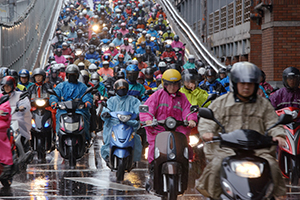 The abrupt decline in greenhouse gas emissions in China due to COVID-19 restrictions played a key role in the record summer rainfall weathered by that country in 2020, according to a Nature Communications paper. “There was heating over land due to aerosol reductions but also cooling over the ocean due to a decrease in greenhouse gases, which intensified the land/sea temperature difference in the summer," lead author Yang Yang, PhD, from Nanjing University of Information Science and Technology, told the BBC. Hundreds of people died and millions were evacuated due to flooding.
The abrupt decline in greenhouse gas emissions in China due to COVID-19 restrictions played a key role in the record summer rainfall weathered by that country in 2020, according to a Nature Communications paper. “There was heating over land due to aerosol reductions but also cooling over the ocean due to a decrease in greenhouse gases, which intensified the land/sea temperature difference in the summer," lead author Yang Yang, PhD, from Nanjing University of Information Science and Technology, told the BBC. Hundreds of people died and millions were evacuated due to flooding.
The Dispatch will be back February 26.
February 16, 2022
COVID-19 case numbers continue to fall across the United States, including in the pediatric population, CIDRAP News reports. Last week, there were about 300,000 pediatric cases reported, far below the peak of 1.15 million in the week ending January 20, although that number remains higher than the peak of the Delta surge. Many states have dropped their mask mandates and have started to plan for the end of COVID-19, with Stateline describing their exit strategies.
The pandemic has resulted in over 1 million excess deaths among Americans, according to US Centers for Disease Control and Prevention (CDC) numbers, mostly from the virus itself but also from exacerbated conditions like heart disease, hypertension, and dementia (Washington Post).
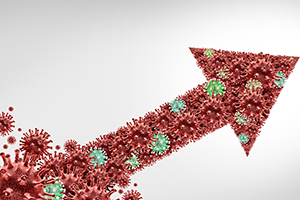 Though the Omicron wave is receding in the US, other parts of the world continue to battle high numbers of infections. In Asia, the Associated Press reports, China’s leader Xi Jinping is urging Hong Kong officials to get control of a surge in cases, and South Korea will hand out free rapid tests at schools and senior care facilities starting next week amid an Omicron-driven wave of infections. And the European office of the World Health Organization (WHO) warned of growing rates of COVID-19 in eastern Europe, where cases have doubled over the last 2 weeks in six countries—Armenia, Azerbaijan, Belarus, Georgia, Russia, and Ukraine.
Though the Omicron wave is receding in the US, other parts of the world continue to battle high numbers of infections. In Asia, the Associated Press reports, China’s leader Xi Jinping is urging Hong Kong officials to get control of a surge in cases, and South Korea will hand out free rapid tests at schools and senior care facilities starting next week amid an Omicron-driven wave of infections. And the European office of the World Health Organization (WHO) warned of growing rates of COVID-19 in eastern Europe, where cases have doubled over the last 2 weeks in six countries—Armenia, Azerbaijan, Belarus, Georgia, Russia, and Ukraine.
Estrogen supplementation in postmenopausal women is associated with a lower risk of dying from COVID-19, according to a study in BMJ Open. The absolute risk of death was 2.1% in women receiving hormone replacement therapy and 4.6% in a control group (OR 0.47; 95% CI 0.34 to 0.63). “Consequently, drugs increasing estrogen levels may have a role in therapeutic efforts to alleviate COVID-19 severity in postmenopausal women and could be studied in randomized control trials,” the authors say.
For the vaccines available in the US, protection against symptomatic SARS-CoV-2 infection was lower during the period of Delta predominance than before the emergence of the variant and also waned over time, a study in JAMA confirms. For the mRNA vaccines in particular, the decline in protection was more strongly related to time than the variant.
In Germany, hospital admission rates across all disease groups fell in 2020 compared with previous years, but an increase in the incidence of in-hospital death was observed only in patients with respiratory diseases, driven by those with SARS-CoV-2 infections, researchers report in JAMA Network Open. “Further research including the investigation of a potential shift of deaths to the outpatient setting is required,” they say.
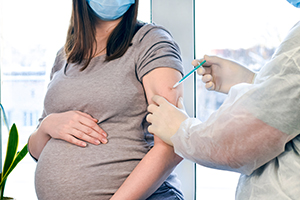 When pregnant women receive an mRNA COVID-19 vaccine, it protects against virus-related hospitalizations in their newborns in the first six months of life, according to research in Morbidity and Mortality Weekly Report. Protection was 61% overall, with a higher rate seen when the primary vaccination series was completed later instead of earlier in pregnancy (80% vs 32%).
When pregnant women receive an mRNA COVID-19 vaccine, it protects against virus-related hospitalizations in their newborns in the first six months of life, according to research in Morbidity and Mortality Weekly Report. Protection was 61% overall, with a higher rate seen when the primary vaccination series was completed later instead of earlier in pregnancy (80% vs 32%).
Disney World and Disneyland will drop mask requirements for vaccinated visitors starting Thursday, the Washington Post reports. Face coverings will be optional for fully vaccinated people both inside and outside, but “we expect guests who are not fully vaccinated to continue wearing face coverings in all indoor locations, including indoor attractions and theaters,” according to the new policy. Masks will still be required for everyone on Disney transportation.
February 14, 2022
On Friday, the US Food and Drug Administration (FDA) authorized an additional monoclonal antibody therapy for the treatment of COVID-19. Bebtelovimab (Eli Lilly), which is said to maintain activity against the Omicron variant, is indicated for mild-to-moderate disease in patients 12 and older who have a positive COVID-19 test, are at high risk for progression to severe disease, and for whom other options are not accessible or clinically appropriate. STAT has more.
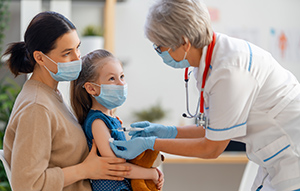 The FDA also postponed an advisory committee meeting to discuss authorization of the vaccine from Pfizer/BioNTech to children ages 6 months to 4 years after the companies informed the agency that new data have emerged. “Based on the agency’s preliminary assessment, and to allow more time to evaluate additional data, we believe additional information regarding the ongoing evaluation of a third dose should be considered as part of our decision-making for potential authorization,” FDA officials said in a statement. According to STAT, “both the FDA and the companies suggested the application for authorization won’t proceed until there are data showing how well the vaccine works after a third dose. Those data should be available in early April, the companies said.”
The FDA also postponed an advisory committee meeting to discuss authorization of the vaccine from Pfizer/BioNTech to children ages 6 months to 4 years after the companies informed the agency that new data have emerged. “Based on the agency’s preliminary assessment, and to allow more time to evaluate additional data, we believe additional information regarding the ongoing evaluation of a third dose should be considered as part of our decision-making for potential authorization,” FDA officials said in a statement. According to STAT, “both the FDA and the companies suggested the application for authorization won’t proceed until there are data showing how well the vaccine works after a third dose. Those data should be available in early April, the companies said.”
Even with a booster dose of mRNA vaccine, protection against COVID-19-associated emergency department and urgent care encounters and hospitalizations waned over time during the periods of Delta and Omicron predominance, but remained relatively strong by the fourth month, according to a study in Morbidity and Mortality Weekly Report. “The finding that protection conferred by mRNA vaccines waned in the months after receipt of a third vaccine dose reinforces the importance of further consideration of additional doses to sustain or improve protection against” these outcomes, the authors say. Additional data in MMWR showed that adverse reactions were less frequent after a homologous mRNA vaccine booster dose than after the second dose of the primary series; myocarditis was rare after a booster dose.
The US Centers for Disease Control and Prevention (CDC) updated its guidance on vaccination for moderately or severely immunocompromised people on Friday, shortening the recommended interval between completion of the primary mRNA vaccination series and a booster dose from at least 5 to at least 3 months. In addition, those who initially received the single-shot Janssen vaccine from Johnson & Johnson should receive an additional dose using one of the mRNA vaccines and then a booster dose (preferably with an mRNA vaccine) in order to be considered up to date.
For people who complete a primary vaccination series with either the Pfizer/BioNTech or Moderna vaccine, the protection derived from a third booster dose may be greater when the other type of shot—rather than the same one—is used, a study out of Singapore suggests. “Heterologous boosting was associated with lower SARS-CoV-2 incidence rates than homologous boosting,” researchers report in JAMA.
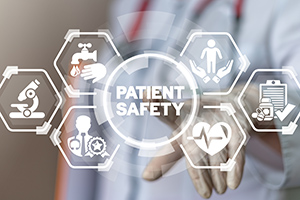 Patient safety has taken a hit during the pandemic, US government researchers highlight in a New England Journal of Medicine perspective. That includes increases in central line-associated bloodstream infections, catheter-associated urinary tract infections, ventilator-associated events, and MRSA bacteremia, as well as jumps in rates of pressure ulcers and falls causing major injury in skilled nursing facilities. “The healthcare sector owes it to both patients and its own workforce to respond now to the pandemic-induced falloff in safety by redesigning our current processes and developing new approaches that will permit the delivery of safe and equitable care across the healthcare continuum during both normal and extraordinary times,” the authors write. “We cannot afford to wait until the pandemic ends.”
Patient safety has taken a hit during the pandemic, US government researchers highlight in a New England Journal of Medicine perspective. That includes increases in central line-associated bloodstream infections, catheter-associated urinary tract infections, ventilator-associated events, and MRSA bacteremia, as well as jumps in rates of pressure ulcers and falls causing major injury in skilled nursing facilities. “The healthcare sector owes it to both patients and its own workforce to respond now to the pandemic-induced falloff in safety by redesigning our current processes and developing new approaches that will permit the delivery of safe and equitable care across the healthcare continuum during both normal and extraordinary times,” the authors write. “We cannot afford to wait until the pandemic ends.”
When clinical trials went virtual during the COVID-19 pandemic, it may have increased the diversity of the patients enrolled, a study in JAMA Network Open suggests. Two trials conducted remotely with online recruitment in the early days of the pandemic saw increases in racial, ethnic, and geographic diversity among participants compared with a third clinic-based trial conducted around the same time. “These findings suggest that remote clinical trials with online advertising may be considered as a strategy to improve diversity among clinical trial participants,” the researchers conclude.
A Turkish man has tested positive for SARS-CoV-2 on 78 straight tests, leaving him isolated from his family for 14 months, Reuters reports. The 56-year-old man, who has leukemia, “has Turkey's longest recorded continuous COVID-19 infection, doctors say, possibly due to a weakened immune system from the cancer. Despite being in and out of hospital since November 2020, his spirits have been high.”
Todd Neale is the Associate News Editor for TCTMD and a Senior Medical Journalist. He got his start in journalism at …
Read Full Bio


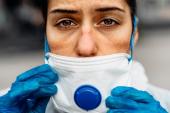

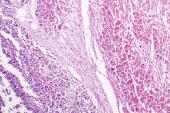
Comments